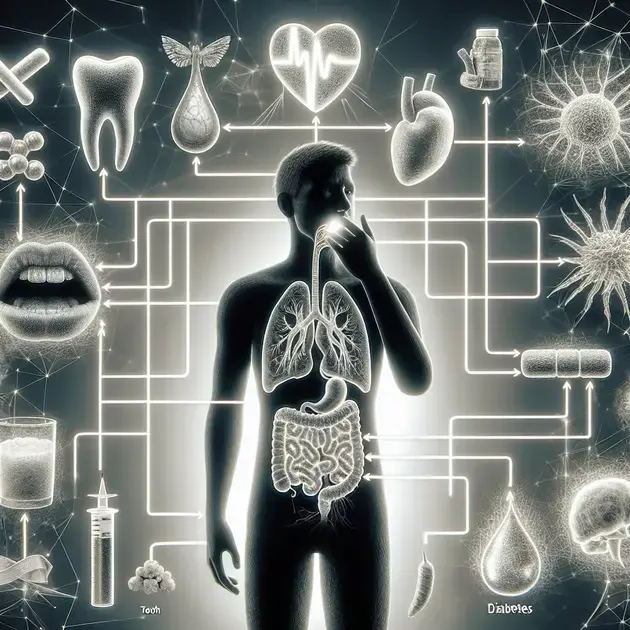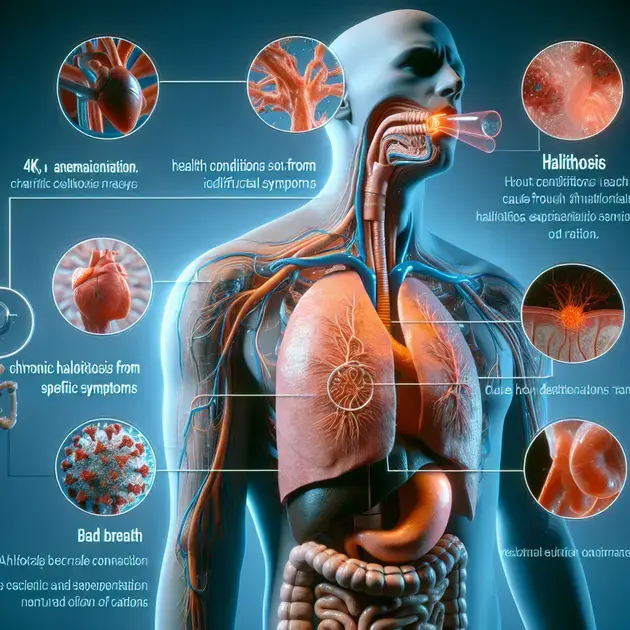Bad breath can be more than just a result of poor oral hygiene; it can also be a symptom of various underlying health conditions. From respiratory infections to gastrointestinal issues, certain diseases can manifest as halitosis. Explore the connection between medical conditions and bad breath in this informative article. Understanding the potential causes of chronic bad breath can lead to early detection and treatment of these underlying diseases.

Common Diseases Linked to Bad Breath
Bad breath, also known as halitosis, can be a symptom of various underlying medical conditions. One common disease linked to bad breath is periodontal disease. This condition affects the gums and bones supporting the teeth, leading to bad breath due to the presence of bacteria in the mouth. To learn more about periodontal disease and its connection to halitosis, visit a trusted medical website like WebMD.
Furthermore, respiratory infections such as sinusitis and bronchitis can also cause bad breath. These infections can lead to postnasal drip, which contributes to the foul odor. For more information on respiratory infections and their impact on oral health, consult the Mayo Clinic website for detailed insights and treatment options.
Gastrointestinal issues like acid reflux and GERD (gastroesophageal reflux disease) are other common diseases associated with bad breath. The regurgitation of stomach acids can result in an unpleasant smell in the mouth. To explore how gastrointestinal problems can lead to halitosis, consider reading articles on the American Gastroenterological Association website.
Diabetes is another medical condition that can contribute to bad breath. When diabetes is not well-managed, it can lead to high blood sugar levels, causing a fruity or acetone-like odor on the breath. To better understand the relationship between diabetes and halitosis, check reliable sources such as the American Diabetes Association website.
Lastly, chronic kidney disease is linked to bad breath as well. Kidney issues can lead to uremia, a buildup of waste products in the body that can cause a fishy or ammonia-like breath odor. For more information on how kidney disease can affect oral health, visit the National Kidney Foundation website.
Medical Conditions That Can Result in Bad Breath
Understanding the medical conditions that can result in bad breath is essential for proper diagnosis and treatment. One such condition is xerostomia, or dry mouth, which can be caused by certain medications, salivary gland issues, or breathing through the mouth. To learn more about xerostomia and its impact on breath odor, refer to reputable sources like the Cleveland Clinic website.
Sinus infections are another factor that can lead to halitosis. The buildup of mucus in the sinuses can create an environment where bacteria thrive, causing bad breath as a result. For in-depth information on sinus infections and their effects on oral health, visit the Johns Hopkins Medicine website.
Some autoimmune diseases, such as Sjogren’s syndrome, can also contribute to bad breath. These conditions affect the body’s ability to produce saliva, leading to dry mouth and an increased risk of halitosis. To explore the connection between autoimmune diseases and bad breath, consult resources like the National Institute of Arthritis and Musculoskeletal and Skin Diseases website.
Respiratory conditions like chronic obstructive pulmonary disease (COPD) can also result in bad breath. The reduced airflow in the lungs in COPD patients can lead to oral hygiene issues and subsequent halitosis. To delve deeper into the relationship between respiratory diseases and bad breath, refer to reputable sources such as the American Lung Association website.
Furthermore, liver disease can manifest in bad breath as well. Conditions like cirrhosis can cause a distinct musty smell on the breath due to the liver’s inability to properly process toxins. For detailed information on liver disease and its impact on oral health, explore resources from organizations like the American Liver Foundation.
Health Issues Associated with Halitosis
Halitosis, commonly known as bad breath, can be indicative of various health issues that warrant attention. An often overlooked factor contributing to halitosis is poor oral hygiene. Inadequate brushing and flossing can lead to the buildup of bacteria in the mouth, resulting in unpleasant breath. To improve oral hygiene practices and combat halitosis, consider referring to dental advice from the American Dental Association.
Another health issue associated with halitosis is diet. Certain foods with strong odors, such as garlic and onions, can leave a lasting smell on the breath. Additionally, low-carb diets that induce ketosis can produce a fruity or acetone-like breath odor. To learn more about dietary influences on halitosis, consult nutrition experts and resources like the Academy of Nutrition and Dietetics website.
Dehydration is also a common health issue that can contribute to halitosis. When the body lacks an adequate amount of water, saliva production decreases, leading to dry mouth and a higher risk of bad breath. To understand the importance of hydration for maintaining fresh breath, explore materials on hydration and oral health from reputable sources like the Centers for Disease Control and Prevention.
Chronic stress and anxiety can exacerbate halitosis as well. Stress can lead to a decrease in saliva production and changes in oral bacteria, contributing to bad breath. To manage stress-related halitosis, consider mindfulness techniques and stress-reducing activities recommended by mental health professionals and organizations like the National Institute of Mental Health.
Lastly, smoking and tobacco use are major factors associated with halitosis and can have detrimental effects on overall oral health. The chemicals in tobacco products can linger in the mouth, causing persistent bad breath and increasing the risk of gum disease and oral cancers. To explore resources on smoking cessation and its impact on halitosis, visit the American Cancer Society website for evidence-based information and support.

How Certain Illnesses Can Contribute to Halitosis
Halitosis, commonly known as bad breath, can stem from various underlying health problems. In many cases, certain illnesses can exacerbate or directly cause chronic bad breath. It is essential to understand the connection between these health issues and halitosis to effectively address the root cause of the problem. Individuals suffering from bad breath should consider seeking medical advice to rule out any potential underlying illnesses that may be contributing to their condition.
Several diseases can lead to bad breath, including respiratory infections, diabetes, and liver or kidney problems. These conditions can impact the body’s natural processes, leading to an imbalance that manifests as oral malodor. Additionally, gastrointestinal issues such as acid reflux or stomach ulcers can also contribute to halitosis. Understanding the association between these diseases and bad breath is crucial for proper diagnosis and treatment.
Respiratory infections, such as sinusitis or bronchitis, can introduce bacteria into the nasal passages and throat, resulting in unpleasant breath odor. Diabetes, a metabolic disorder, can cause changes in saliva composition and lead to dry mouth, a common factor in halitosis. Liver and kidney problems can affect the body’s ability to filter out toxins, resulting in odorous compounds being released through the breath.
Individuals with gastrointestinal conditions like acid reflux may experience regurgitation of stomach acids into the esophagus, leading to a sour taste in the mouth and foul breath. Similarly, stomach ulcers can harbor bacteria that produce sulfur compounds responsible for bad breath. By addressing these underlying health issues, individuals can effectively manage and reduce halitosis.
Underlying Health Problems and Their Impact on Bad Breath
Bad breath can often be a symptom or side effect of underlying health problems affecting various systems in the body. Understanding how these health issues impact oral malodor is essential for proper management and treatment. By addressing the root causes of bad breath, individuals can improve their overall health and quality of life. Seeking medical evaluation for persistent halitosis is crucial to identifying any potential underlying health problems contributing to the condition.
Health problems such as respiratory conditions, diabetes, liver or kidney diseases, and gastrointestinal issues can significantly impact breath odor. Respiratory infections can lead to the accumulation of bacteria in the throat and nasal passages, resulting in bad breath. Likewise, diabetes can cause dry mouth and alterations in saliva composition, leading to halitosis.
Liver and kidney diseases can affect the body’s ability to eliminate toxins, resulting in the release of odorous compounds through the breath. Individuals with gastrointestinal issues like acid reflux or stomach ulcers may experience regurgitation of stomach acids or bacterial overgrowth, contributing to foul breath odor. Addressing these underlying health problems is essential for managing halitosis effectively.
By working with healthcare providers to diagnose and treat these conditions, individuals can improve their oral health and overall well-being. Proper management of these underlying health issues can lead to a reduction in bad breath and enhance quality of life. Maintaining a healthy lifestyle, practicing good oral hygiene, and seeking appropriate medical care are key steps in addressing the impact of underlying health problems on halitosis.
Disease-Related Causes of Chronic Halitosis
Chronic halitosis, or persistent bad breath, can be linked to various disease-related causes that affect oral health and overall well-being. Understanding the relationship between these diseases and bad breath is crucial for effectively addressing the issue. By identifying and treating the underlying conditions contributing to chronic halitosis, individuals can experience improvements in breath odor and quality of life. Seeking professional medical advice is essential for proper diagnosis and management of disease-related causes of bad breath.
Several diseases can contribute to chronic halitosis, including respiratory infections, diabetes, liver or kidney problems, and gastrointestinal disorders. Respiratory infections can lead to the accumulation of bacteria in the respiratory tract, resulting in foul breath odor. Diabetes can cause changes in saliva production and composition, leading to dry mouth and halitosis.
Liver and kidney diseases can impact the body’s ability to eliminate toxins, leading to the release of odorous compounds through the breath. Gastrointestinal disorders such as acid reflux and stomach ulcers can introduce bacteria and acids into the oral cavity, contributing to bad breath. By addressing these disease-related causes, individuals can effectively manage halitosis and improve their oral health.
Proper diagnosis and treatment of underlying health conditions are essential for addressing chronic halitosis. Healthcare professionals can provide guidance on managing these diseases to reduce the impact on breath odor. Adopting a holistic approach to oral care, including regular dental visits, maintaining good oral hygiene practices, and monitoring overall health, can help individuals combat the disease-related causes of bad breath effectively.
**
Conclusion
**
In conclusion, bad breath, or halitosis, can serve as a red flag for various underlying health issues, ranging from periodontal disease and respiratory infections to diabetes, liver or kidney problems, gastrointestinal disorders, and more. Understanding the correlation between these medical conditions and halitosis is crucial for effective diagnosis and treatment.
By delving into the root causes of bad breath, individuals can not only address oral malodor but also potentially improve their overall health and quality of life. Seeking medical advice to investigate potential underlying illnesses contributing to halitosis is a proactive step towards identifying and managing the issue effectively.
Furthermore, recognizing how respiratory infections, diabetes, liver or kidney diseases, and gastrointestinal problems impact breath odor aids in devising targeted treatment plans. Proper management of these health conditions can lead to a reduction in bad breath, enhancing both oral health and general well-being.
By collaborating with healthcare professionals, individuals can navigate diagnosis and treatment pathways, ultimately fostering improved oral hygiene and overall health. Embracing a holistic approach that includes regular dental care, consistent oral hygiene practices, and proactive health monitoring can significantly aid in mitigating the impacts of underlying health problems on halitosis.
In essence, addressing disease-related causes of chronic halitosis necessitates a comprehensive understanding of how various medical conditions contribute to oral malodor. Through informed decision-making, consistent healthcare consultations, and dedicated lifestyle adjustments, individuals can effectively manage bad breath and elevate their oral and overall health in a holistic manner.